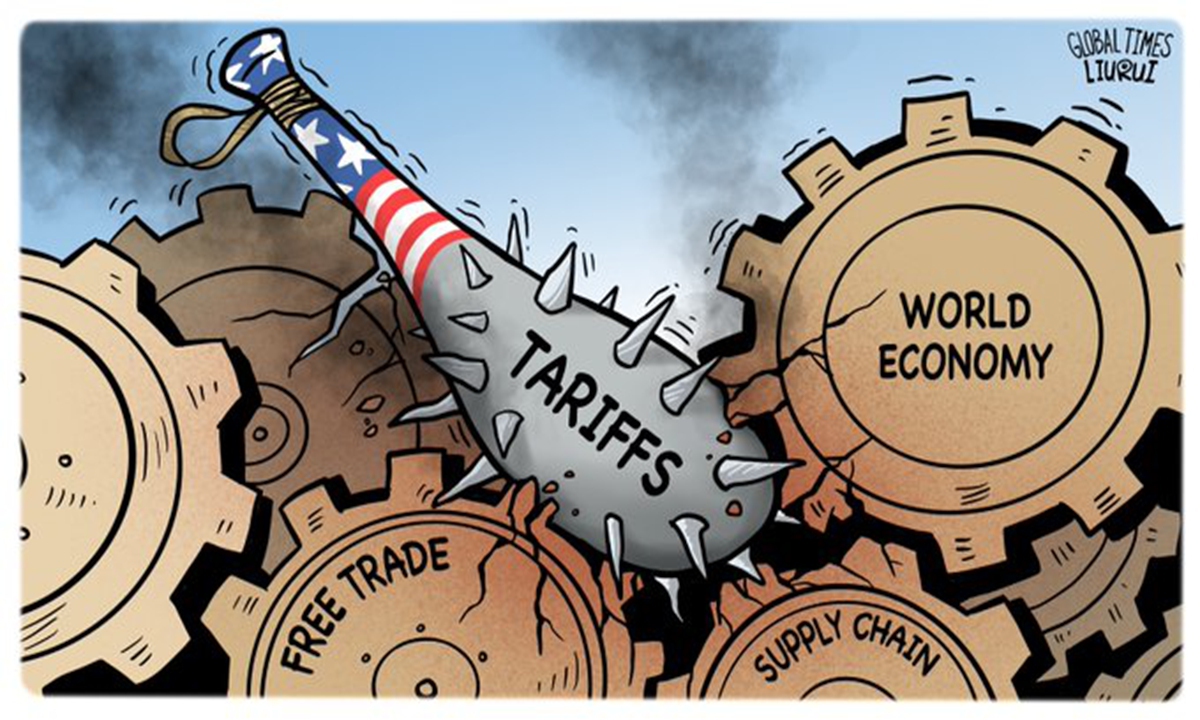How many industries face tariff risks under US ‘security’ agenda?

Illustration: Liu Rui/GT
How many industries will face potential tariffs within the US "national security" agenda? The question has again been thrust into the spotlight with the latest move by the US Department of Commerce.
The US Commerce Department said on Wednesday it has opened new national security investigations into the import of personal protective equipment, medical items, robotics and industrial machinery, Reuters reported.
The new investigation, the latest in a series of Section 232 investigations initiated by the US government in recent months, further expands the scope of industries potentially facing tariffs, according to Bloomberg.
Investigations into imports of pharmaceuticals, semiconductors, aircraft, critical minerals, medium- and heavy-duty trucks, and other products are ongoing. The US government has already used the law to impose levies on automobiles, copper, steel and aluminum, according to Bloomberg.
It seems that in Washington's policy logic, any commodity can be easily linked to "national security." This represents a distortion of the security concept that has been reduced to a tool for the US to pursue trade protectionism.
A look back reveals that this abuse of "national security" by the US was uncommon in the past. Even when the US conducted investigations related to "national security," it exercised necessary restraint in making trade sanctions under the guise of "national security." From the 1980s to the early 21st century, the US initiated 14 investigations under Section 232 but only implemented punitive measures twice, according to cctv.com.
In recent years, this restraint has gradually disappeared. With the expansion and arbitrary interpretation of the concept of "national security," the application of Section 232 has extended from traditional strategic resource areas such as steel and aluminum to more areas such as high-tech and medical fields that are closely related to global industrial collaboration.
From medical supplies that safeguard public health to industrial robots and precision machinery that support manufacturing development, these goods that should be part of normal international trade have been included in the "national security" assessment system.
This trend reveals a systematic effort by the US to use "national security" as a pretext for restructuring global supply chains. The logic is clear: by raising import barriers, the US aims to force domestic companies to adjust their production, promote domestic industry relocation, and reduce dependence on overseas suppliers, particularly those deemed strategic competitors.
However, whether this policy adjustment can achieve the expected results depends on whether the US can completely achieve large-scale domestic substitution of imported goods. Given the current state of the US industrial sector, achieving this goal is extremely difficult.
The fundamental challenge for many US industries is not a lack of protection from imports, but deep-seated structural issues like high labor costs, aging infrastructure, and incomplete industrial ecosystems. In sectors such as medical equipment and industrial machinery, where US self-sufficiency is limited, hastily imposing tariffs risks causing supply shortages, procurement delays, and increased costs for businesses and consumers. These added costs will ultimately be passed down, fueling inflation and stifling economic vitality. Furthermore, when it comes to public health, barriers to importing essential supplies could directly undermine the nation's response capacity, achieving the opposite of the stated security goal.
More critically, in today's deeply interconnected global economy, protectionism inevitably leads to lose-lose outcomes. Responses from various affected countries could bring more uncertainty and repercussions. Thus, the ultimate outcome depends not solely on US actions but on the reactions of its trading partners across global supply chains.
History and reality have consistently showed that genuine supply chain security is rooted in openness and collaboration. The attempt by the US to ensure its own interests by creating trade conflicts and hurting others is undoubtedly putting the cart before the horse.
Photos
Related Stories
- Trump orders deployment of troops to Portland
- Does U.S. army return to Afghanistan realistic?
- Is Washington really willing to be the ‘lonely outlier’ on the Palestinian issue?: Global Times editorial
- U.S. government shutdown looms after Senate rejects stopgap bill
- Trump's Britain visit leaves unsettling tech pact, lingering disputes
Copyright © 2025 People's Daily Online. All Rights Reserved.









